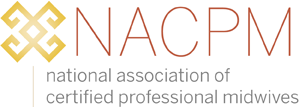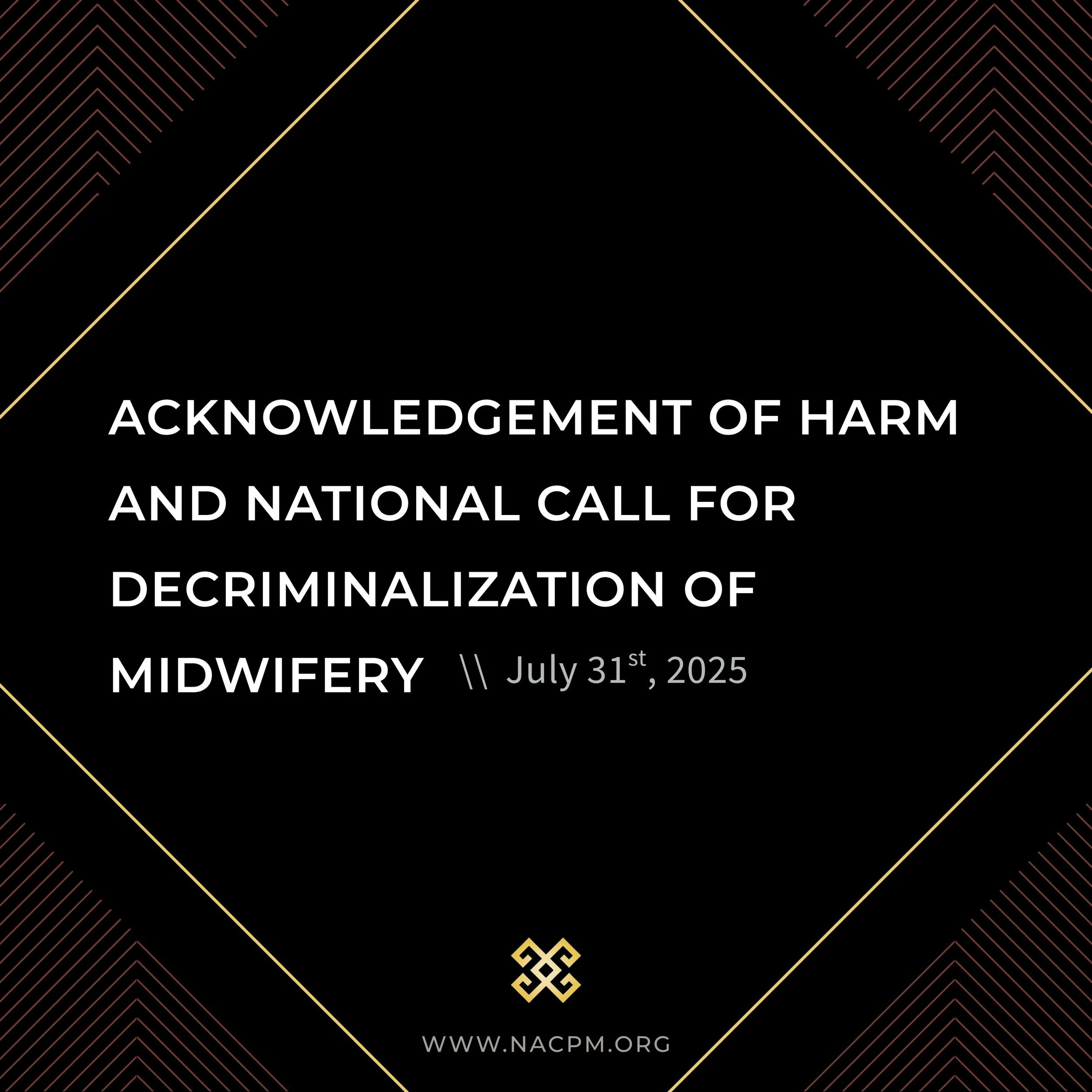The National Association of Certified Professional Midwives (NACPM) honors and mourns the silencing of generations of Indigenous, Black, immigrant, enslaved, religious and rural midwives whose wisdom, devotion, and embodied care sustained families and communities long before midwifery was institutionalized in the United States. Their knowledge was not lost, but suppressed by colonization, by the rise of medical dominance, and by systems rooted in white supremacy. And yet, that wisdom persists. It lives on in ancestral memory, community care, and the ongoing resistance of midwives who continue to serve outside the bounds of state and institutional recognition.
NACPM recognizes that the creation and structuring of the Certified Professional Midwife (CPM) credential, along with the systems and pathways built around it, contributed to the erasure, exclusion and marginalization of many of those very traditions. While the aim was to bring visibility, legitimacy, and broader access to midwifery care, the credentialing process was led primarily by white, cisgender, heterosexual women and reflected dominant cultural worldviews. In centering professionalization, the credential often failed to center people. In building systems to legitimize midwifery, the profession did not always fight equally for those whose practices never needed legitimacy in the first place.
As state licensing systems grew, and with them, governmental authority (rather than authority granted by the community) to practice midwifery there was not enough done to protect those practicing outside these systems. In many states, midwifery without a license remains sanctioned, and midwives working in traditional or ancestral ways are still fined for serving their communities. NACPM names this as a harm that continues, and a harm that must be repaired.
At the same time, we want to be clear: the creation of state midwifery licensing boards has played a vital role in stopping felony prosecution of midwifery by establishing it as a profession separate and distinct from the practice of medicine. These structures help increase access to midwifery care.
High-quality, respectful, and evidence-informed care is best achieved when Certified Professional Midwives (CPMs) are recognized as independent and autonomous primary care providers, practicing to the full extent of their education and competencies. Health systems that foster open communication, mutual respect, seamless coordination, and smooth transfers of care between all providers support better outcomes and uphold the principles of client-centered care.
NACPM does not support laws or policies that require signed collaborative agreements or supervision by other providers as a condition of licensure, the provision of physiologic care, or reimbursement.
Midwifery is both a human right and a cultural inheritance. Every person has the right to bodily autonomy, including the freedom to choose where and with whom they give birth. Mandated collaborative agreements threaten this right by creating conditions in which midwives may be forced to practice outside licensure when consulting providers refuse to collaborate. These refusals are often rooted in fear of vicarious liability, misinformation, provider bias, or economic competition. Autonomous practice is the international standard endorsed by ICM and mandates of collaborative agreements or supervision:
Do not guarantee or promote effective interprofessional communication;
Compromise client safety or health outcomes;
Create unnecessary barriers to care, especially during public health emergencies;
Restrict access to improved outcomes in underserved and marginalized communities;
Reinforce false assumptions about CPMs requiring supervision;
Undermine midwifery autonomy and client choice;
Criminalize midwifery care.
NACPM strongly supports interprofessional collaboration grounded in mutual respect, professional accountability, and shared responsibility for equitable representation. We promote care systems that enable CPMs and other providers to work together transparently and ethically—without contractual oversight or financial gatekeeping by one profession over another. We affirm the collective responsibility of providers to inform clients, without coercion, about their care options, provider scope, and educational background.
They have helped midwives who are not holding the CPM credential move out of legal vulnerability, allowing them to practice to their full scope and with sustainability. We honor this progress, while holding space for the work that remains to dignify what our collective history has created for us to hold.
Moving forward, NACPM will speak out against any law or policy that subjects midwives—licensed or unlicensed—to the threat of incarceration for practicing midwifery. No midwife should face arrest, prosecution, or incarceration for providing care to families, especially not care that is rooted in deep tradition, community trust, and cultural accountability. NACPM is committed to continuing to provide education, data collection, and analysis on the benefits of full decriminalization of midwifery.
Licensure is a system designed for credentialed midwives, and it is not the right fit for all practitioners. While NACPM advocates for strong, inclusive licensing frameworks for CPMs, we also affirm that non-credentialed midwives are valuable members of the midwifery profession. For those midwives who are not credentialed, as colleagues, we ask for clarity on how we and consumers might distinguish their work from that of individuals who attend births without having completed comprehensive midwifery apprenticeships. This clarity helps ensure families have the information they need to make empowered, informed choices, while upholding the integrity of all midwifery paths.
NACPM believes deeply that access to midwifery care is a human right as is the right of families to choose where and with whom to give birth, and to parent according to their own values. Bodily autonomy and informed decision making are central to midwifery and to human rights. But these rights only matter when they are supported with accurate information and protected by fair policies. That means consumers must have access to clear, transparent information about the qualifications, training, and legal status of the midwives they work with. It also means legislators must create systems that protect the right of people to choose their providers without putting those providers at risk of criminalization while also upholding public safety through policies that ensure informed choice, clear distinctions between provider types, and appropriate emergency planning.
Midwifery is a cultural treasure and a community resource. It is a profession, a calling, and a lifeline especially in communities where access to maternity care is limited or broken. It exists across a spectrum of education, training, and accountability systems. At NACPM we believe midwives and policy makers are capable of difficult and nuanced conversations about this complexity while honoring individual choice.
NACPM calls for a future in which:
No midwife faces criminal charges for practicing within their community;
Licensure remains strong, meaningful, and inclusive—reflecting the real pathways midwives take to learn and serve;
Non-credentialed midwives can practice openly with systems in place for honest disclosure, emergency preparedness, and accountability;
And families are empowered by laws that protect both their autonomy and their informed choice.
This is not about choosing one path over another. It’s about building a world where all midwives can do their work without fear and collaborate across fields as needed—and where all families can access the care they want and deserve.
Some of the ways NACPM is putting this vision into action include developing an internal framework for how we respond when proposed legislation undermines our values—such as templates for legislative support letters and guidance for identifying key legislators to contact. We are also actively building collaborative relationships with other midwifery organizations and CPM pillar organizations to support the profession as a whole, and to stand together as we each move the profession and our organizations forward. Finally, we are pacing our leadership to leave no midwife behind, committing to both ongoing education on bias and intersectionality, and to advancing access to education and certification so that more midwives can become CPMs, regardless of their background or means.
This acknowledgement is not the end of the story. It is a commitment to move forward with courage, compassion, and clarity. NACPM will continue to stand for Certified Professional Midwives, for families, and for the broader vision of midwifery as a human right and a force for justice. Let us honor those who came before us by protecting those who are still here. Let us walk forward together, holding the full complexity of midwifery with open hands and a shared commitment to equity, safety, and love.
Citations
Ross, Loretta, et al. “RJ Founding Mothers: The Origins of Reproductive Justice.” Women of African Descent for Reproductive Justice, 1994.
UNESCO. (2023). Decision of the Intergovernmental Committee: 18.COM 8.B.26. UNESCO Intangible Cultural Heritage.
Acknowledgement of Harm and National Call for Decriminalization of Midwifery was approved by the NACPM Board of Directors on July 24, 2025.
MLA Citation: Acknowledgement of Harm and National Call for Decriminalization of Midwifery. National Association of Certified Professional Midwives, 24 July 2025. Approved by the NACPM Board of Directors.
APA Citation: National Association of Certified Professional Midwives. (2025, July 24). Acknowledgement of Harm and National Call for Decriminalization of Midwifery.

